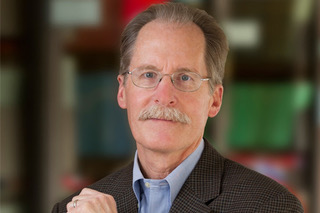Well-known geneticist Huntington F. Willard, PhD, to share cutting-edge ideas and updates with healthcare CEOs and administrators attending the Precision Medicine Institute’s 2019 symposium.
It’s been a little more than a year since Geisinger launched its National Precision Health Initiative, a first-of-its kind unit designed to advance the promise of anticipatory medicine at Geisinger and at healthcare systems throughout the United States.
More than a decade in the making, the national-facing program has been the first to step beyond the boundaries of genomic research and implement its direct integration into clinical medicine, particularly as a population-health screening tool.
“What Geisinger did was jump out ahead of the prevailing opinion that genomic information was not ready for prime time clinically,” says Huntington F. Willard, PhD, director of the program. “We said, ‘there are discoveries that we know enough about now, and there’s strong enough evidence that they can be applied to clinical medicine now. Let’s do it.’”
A returning presenter, Willard will share the latest news about the fast-moving initiative at the Precision Medicine Institute Symposium 2019, taking place May 2-3 at the Sheraton Hotel in New Orleans. Additionally, the former president of the American Society of Human Genetics, founding director of the Duke Institute for Genome Sciences & Policy, and co-editor of the first textbook on precision medicine says he’s looking forward to sharing a dialogue with fellow healthcare executives about their successes, as well as implementation and care gaps at their institutions that Geisinger National Precision Health may be able to help fill.
“I firmly believe that Geisinger may have been the first, but absolutely should not be the only place that does this,” he says. “We want to make sure that other groups develop the kind of culture and approach to medicine and precision health that can make the best use of this information. That’s true healthcare, not just sick care.”

Director of the Geisinger National Precision Health Unit, Huntington F. Willard, PhD, is an internationally recognized leader in human genetics and genomics, with a long record of innovative, integrative, and forward-looking leadership in both academia and healthcare. He is a former President of the American Society of Human Genetics, founding director of the Duke Institute for Genome Sciences & Policy (2003-2014), and the 15th President of the Marine Biological Laboratory (2015-2017).
Solving the financial puzzle
Although Willard acknowledges that there’s still much more to learn about the human genome and its impact on clinical medicine, the questions he and his team are working to answer are not solely about the science.
“The fundamental issue—the largest road block—is how we are going to pay for it,” says Willard. “We have a group here that is working diligently on figuring out the right pricing structure and who should pay the cost, working with the payer, provider, and technology communities.”
In the meantime, Geisinger does not charge its patients for clinical exome screening. “That’s not sustainable in the long run, of course,” Willard says. “This is not a strategy that is scalable to millions and millions of patients, nor is it yet scalable to all health systems around the country. But we will get there.”
While work on pricing and payment strategies continues, available data suggest that preventing disease through population health screening will save money over time in some cases.
“In the long term, it’s very clear that if you can identify disease at the earliest possible stage, the cost of lifelong care is greatly reduced,” Willard says. For example, preventing diabetes in an individual with an inherited genomic variant predicting increased risk of diabetes also prevents downstream expenses related to vascular and other complications that commonly develop when diabetes is diagnosed only after a person becomes ill.
Clearing up DTC confusion
Another task underway for the industry surrounds the role of various direct-to-consumer (DTC) genetic test offerings. “The different approaches are easily confused by the public at large and even by healthcare professionals themselves,” says Willard. For example, some DTC companies offer full genome or exome sequencing, while others merely spot test around the genome, he explains.
“To be blunt, not all DTC companies are fully transparent about what they’re actually offering—so the consumer is at risk of signing on for something because it sounds cool and convincing—when in fact it is not easily or broadly translated into healthcare at all,” Willard says.
It’s a problem that can be remedied, he says, by working with DTC companies to create linkages between relevant findings from their tests and consumers’ local physicians and health systems. “We’re aware of that need, and to do that, we’re trying to work with some companies that are openminded enough to think they need help with making that linkage,” he says.
These and other complex topics will be ripe for discussion at the upcoming Precision Medicine Institute Symposium. To register, go to https://www.precisionmedicineforhospitals.com.
—Debra A. Shute
Related Information:
Precision Medicine Institute Symposium 2019
Geisinger Launches National Precision Health Initiative
